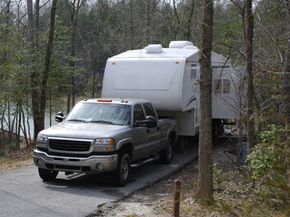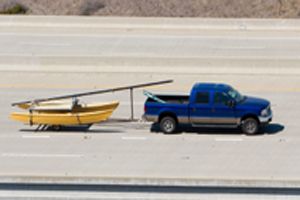Anyone who's ever had to carry a sleeping child or lift a bottom-heavy box knows what dead weight is. You may have also heard of something called towing weight. Both have something to do with towing, but what's the difference between the two?
The answer is actually found in your trailer hitch. Dead weight (called weight carrying towing capacity by auto manufacturers) is a common term for the maximum amount of weight your vehicle can tow with a simple ball hitch trailer coupling. With this basic hitch, the force of the trailer's added weight is localized on the tow vehicle's rear axle. Exceeding a tow vehicle's dead weight rating could make the front of the coach leave the ground, a potentially terrible situation to face when you're speeding down the highway.
Advertisement
Since it's the higher of the two ratings, towing weight is the number that you'll see on advertisements and touted by car dealers. The vehicle's towing weight, also known as its weight distributing towing capacity, is the total amount of weight the vehicle can tow using a weight-distribution towing hitch. This specialized hitch employs spring bars -- rods that can be adjusted to distribute the weight between the trailer and the tow vehicle. This weight is further distributed throughout the tow vehicle, up to the front wheels. Since more of the tow vehicle is carrying the weight, you can tow more weight.
As a result, you'll often see a wide gulf between the weight carrying and weight distribution ratings for towing capacities among trucks designed with tow packages. The 2006 Dodge Ram 3500 diesel, for example, is rated by the manufacturer with a weight carrying towing capacity of 5,000 pounds (2,272 kg) and a weight distributing capacity of 15,650 pounds (7,113 kg) [source: GCN]. Other types of hitches exceed both of these capacities. Specialty hitches, like the gooseneck hitch, where the hitch receiver is mounted in the bed of a truck, distribute weight even more efficiently. This type of hitch is capable of towing up to 30,000 pounds (13,636 kg) [source: Trailer Hitches 4U].
Before loading up the trailer with bricks and heading out to test your truck's mettle, there's another rating you need to know about. Read the next page to learn about tongue weight.
Advertisement




